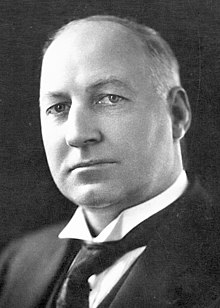Lionel Hill
| Lionel Hill | |
|---|---|
 |
|
| 30th Premier of South Australia Elections: 1927, 1930 |
|
|
In office 17 April 1930 – 13 February 1933 |
|
| Monarch | George V |
| Governor | Earl of Gowrie |
| Preceded by | Richard L. Butler |
| Succeeded by | Robert Richards |
|
In office 28 August 1926 – 8 April 1927 |
|
| Monarch | George V |
| Governor | Sir Tom Bridges |
| Preceded by | John Gunn |
| Succeeded by | Richard L. Butler |
| 21st Leader of the Opposition (SA) | |
|
In office 1927–1930 |
|
| Preceded by | Richard L. Butler |
| Succeeded by | Richard L. Butler |
| 8th Australian Labor Party (SA) leader | |
|
In office 1926–1931 |
|
| Preceded by | John Gunn |
| Succeeded by | Edgar Dawes |
| Personal details | |
| Political party | Australian Labor Party (SA) |
Lionel Laughton Hill (14 May 1881 – 19 March 1963) was the thirtieth Premier of South Australia, representing the South Australian Branch of the Australian Labor Party.
Born in Adelaide, South Australia but raised on a farm near Maitland, Hill left school aged 12 to work on the South Australian government railways, where he first became involved in the labour movement. This led to his appointment as the secretary-treasurer of the Boilermakers' Assistants' Union in 1901, a position he held until 1914. Hill was also able to combine his work with a distinguished Australian rules footballing career, starring for Norwood Football Club in the South Australian National Football League in the first years of the twentieth century and representing South Australia.
After marrying in 1908, Hill further increased his stature in the labour movement in 1910 by becoming secretary of the South Australian branch of the Australian Tramway Employees' Association and its federal president in 1912. Hill then gained Australian Labor Party pre-selection for the South Australian House of Assembly electorate of East Torrens, which he duly won at the 1915 election.
In parliament Hill was considered "a slow thinker and unimpressive orator" but gained statewide recognition for his role as President of the Anti-Conscription Council, an issue so divisive during World War I that it caused the 1916 Labor split. In the wake of the split, Hill resigned his East Torrens seat in 1917 to unsuccessfully contest the Australian Senate elections as an anti-conscriptionist Labor candidate.
...
Wikipedia
